Newman University COU405 Portfolio: Ethical Issues in Counselling
VerifiedAdded on 2022/08/16
|8
|1327
|10
Portfolio
AI Summary
This portfolio assignment, completed for the COU405 module at Newman University, analyzes two case studies to identify and evaluate ethical issues in counselling. The assignment focuses on applying ethical principles such as justice, fidelity, and beneficence to real-world scenarios involving a client with anger management issues and a client who is terminally ill. The analysis considers the ethical responsibilities of the counsellor, including confidentiality, maintaining professional boundaries, and acting in the best interests of the client. The portfolio examines how these principles apply to complex situations and explores the potential consequences of various courses of action, referencing relevant ethical frameworks and literature to support the arguments. The cases highlight challenges related to client safety, therapeutic relationships, and end-of-life wishes.
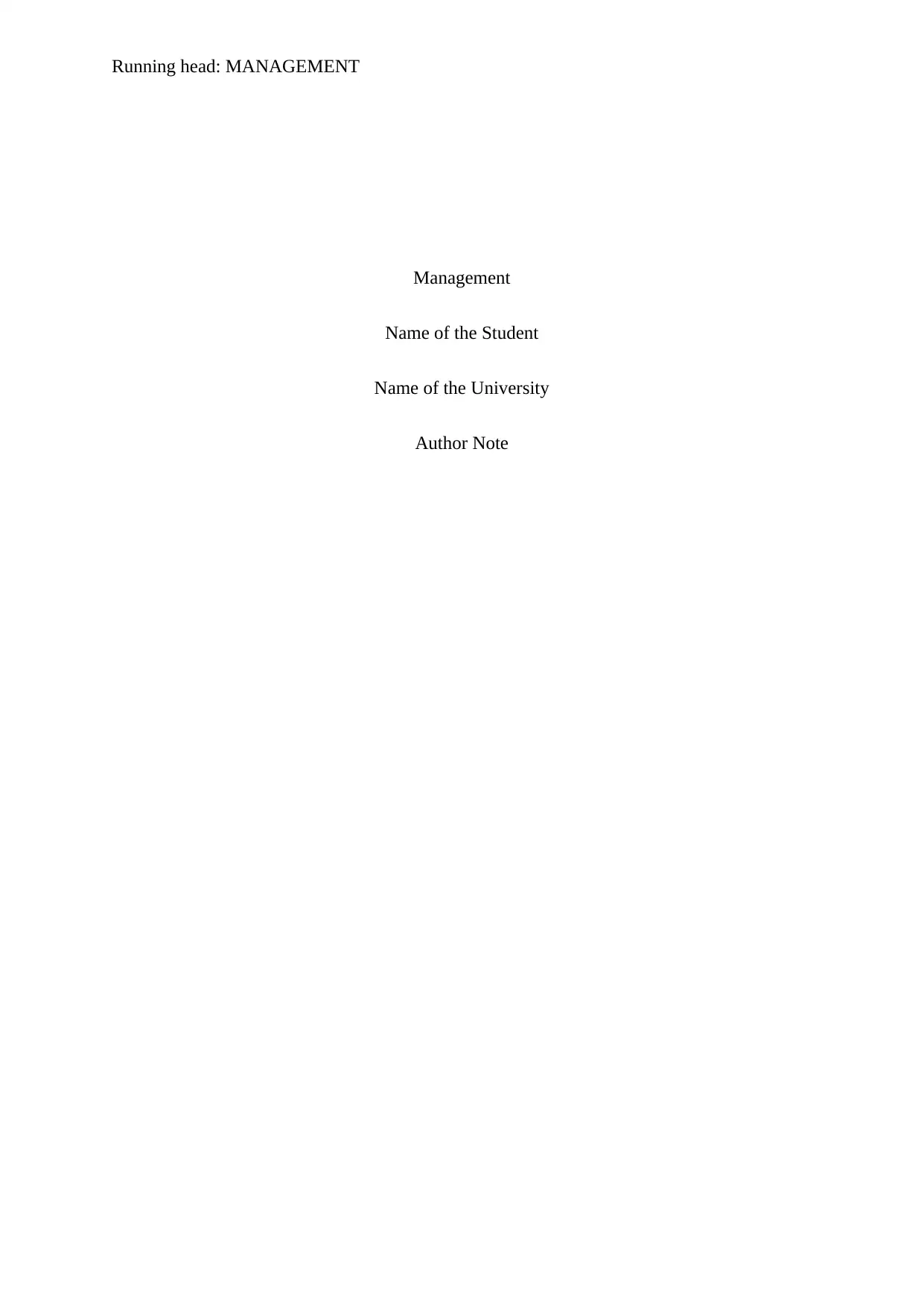
Running head: MANAGEMENT
Management
Name of the Student
Name of the University
Author Note
Management
Name of the Student
Name of the University
Author Note
Paraphrase This Document
Need a fresh take? Get an instant paraphrase of this document with our AI Paraphraser

1MANAGEMENT
Table of Contents
Case Study 1:..............................................................................................................................3
Case Study 2:..............................................................................................................................4
References:.................................................................................................................................7
Table of Contents
Case Study 1:..............................................................................................................................3
Case Study 2:..............................................................................................................................4
References:.................................................................................................................................7
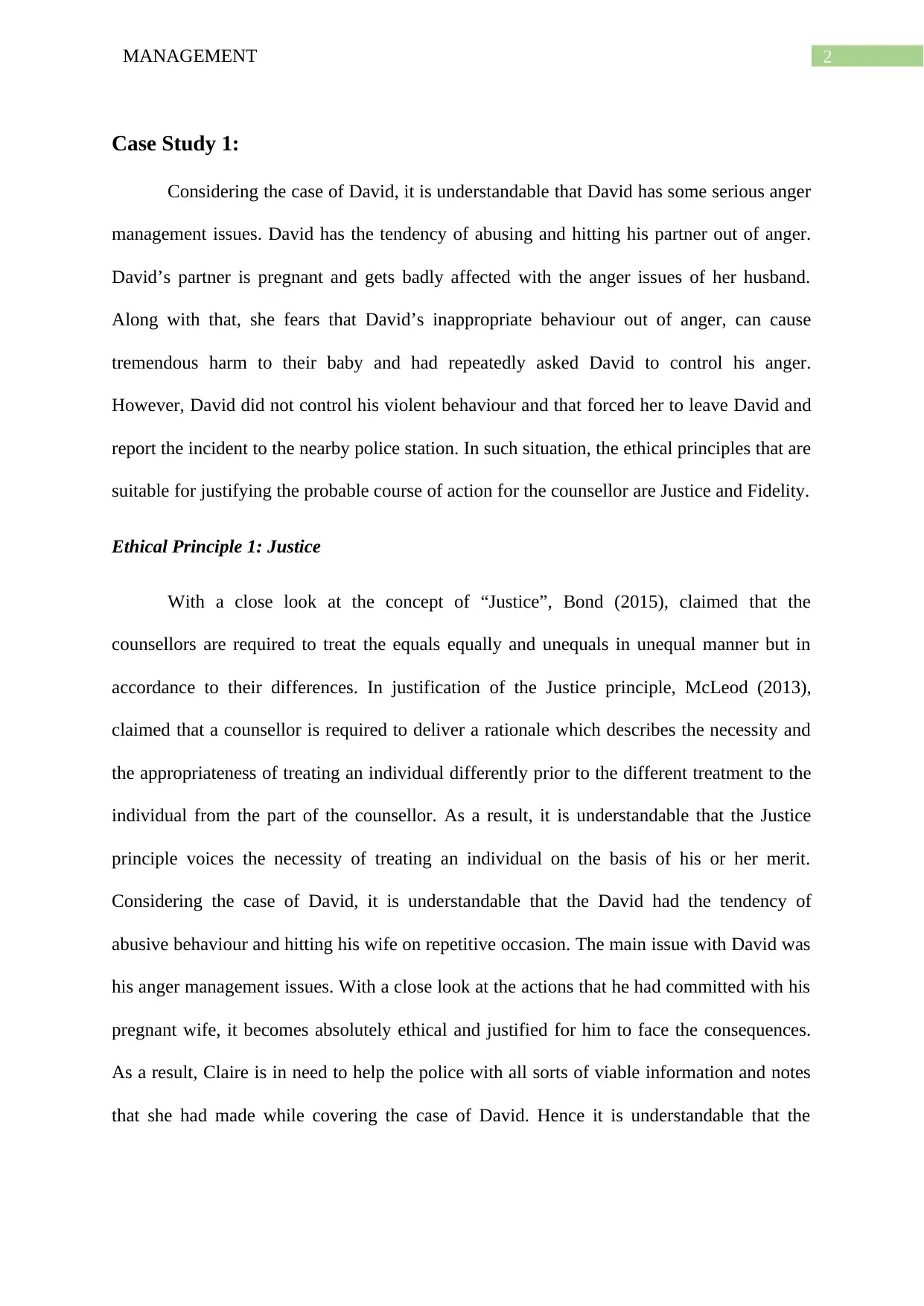
2MANAGEMENT
Case Study 1:
Considering the case of David, it is understandable that David has some serious anger
management issues. David has the tendency of abusing and hitting his partner out of anger.
David’s partner is pregnant and gets badly affected with the anger issues of her husband.
Along with that, she fears that David’s inappropriate behaviour out of anger, can cause
tremendous harm to their baby and had repeatedly asked David to control his anger.
However, David did not control his violent behaviour and that forced her to leave David and
report the incident to the nearby police station. In such situation, the ethical principles that are
suitable for justifying the probable course of action for the counsellor are Justice and Fidelity.
Ethical Principle 1: Justice
With a close look at the concept of “Justice”, Bond (2015), claimed that the
counsellors are required to treat the equals equally and unequals in unequal manner but in
accordance to their differences. In justification of the Justice principle, McLeod (2013),
claimed that a counsellor is required to deliver a rationale which describes the necessity and
the appropriateness of treating an individual differently prior to the different treatment to the
individual from the part of the counsellor. As a result, it is understandable that the Justice
principle voices the necessity of treating an individual on the basis of his or her merit.
Considering the case of David, it is understandable that the David had the tendency of
abusive behaviour and hitting his wife on repetitive occasion. The main issue with David was
his anger management issues. With a close look at the actions that he had committed with his
pregnant wife, it becomes absolutely ethical and justified for him to face the consequences.
As a result, Claire is in need to help the police with all sorts of viable information and notes
that she had made while covering the case of David. Hence it is understandable that the
Case Study 1:
Considering the case of David, it is understandable that David has some serious anger
management issues. David has the tendency of abusing and hitting his partner out of anger.
David’s partner is pregnant and gets badly affected with the anger issues of her husband.
Along with that, she fears that David’s inappropriate behaviour out of anger, can cause
tremendous harm to their baby and had repeatedly asked David to control his anger.
However, David did not control his violent behaviour and that forced her to leave David and
report the incident to the nearby police station. In such situation, the ethical principles that are
suitable for justifying the probable course of action for the counsellor are Justice and Fidelity.
Ethical Principle 1: Justice
With a close look at the concept of “Justice”, Bond (2015), claimed that the
counsellors are required to treat the equals equally and unequals in unequal manner but in
accordance to their differences. In justification of the Justice principle, McLeod (2013),
claimed that a counsellor is required to deliver a rationale which describes the necessity and
the appropriateness of treating an individual differently prior to the different treatment to the
individual from the part of the counsellor. As a result, it is understandable that the Justice
principle voices the necessity of treating an individual on the basis of his or her merit.
Considering the case of David, it is understandable that the David had the tendency of
abusive behaviour and hitting his wife on repetitive occasion. The main issue with David was
his anger management issues. With a close look at the actions that he had committed with his
pregnant wife, it becomes absolutely ethical and justified for him to face the consequences.
As a result, Claire is in need to help the police with all sorts of viable information and notes
that she had made while covering the case of David. Hence it is understandable that the
⊘ This is a preview!⊘
Do you want full access?
Subscribe today to unlock all pages.

Trusted by 1+ million students worldwide
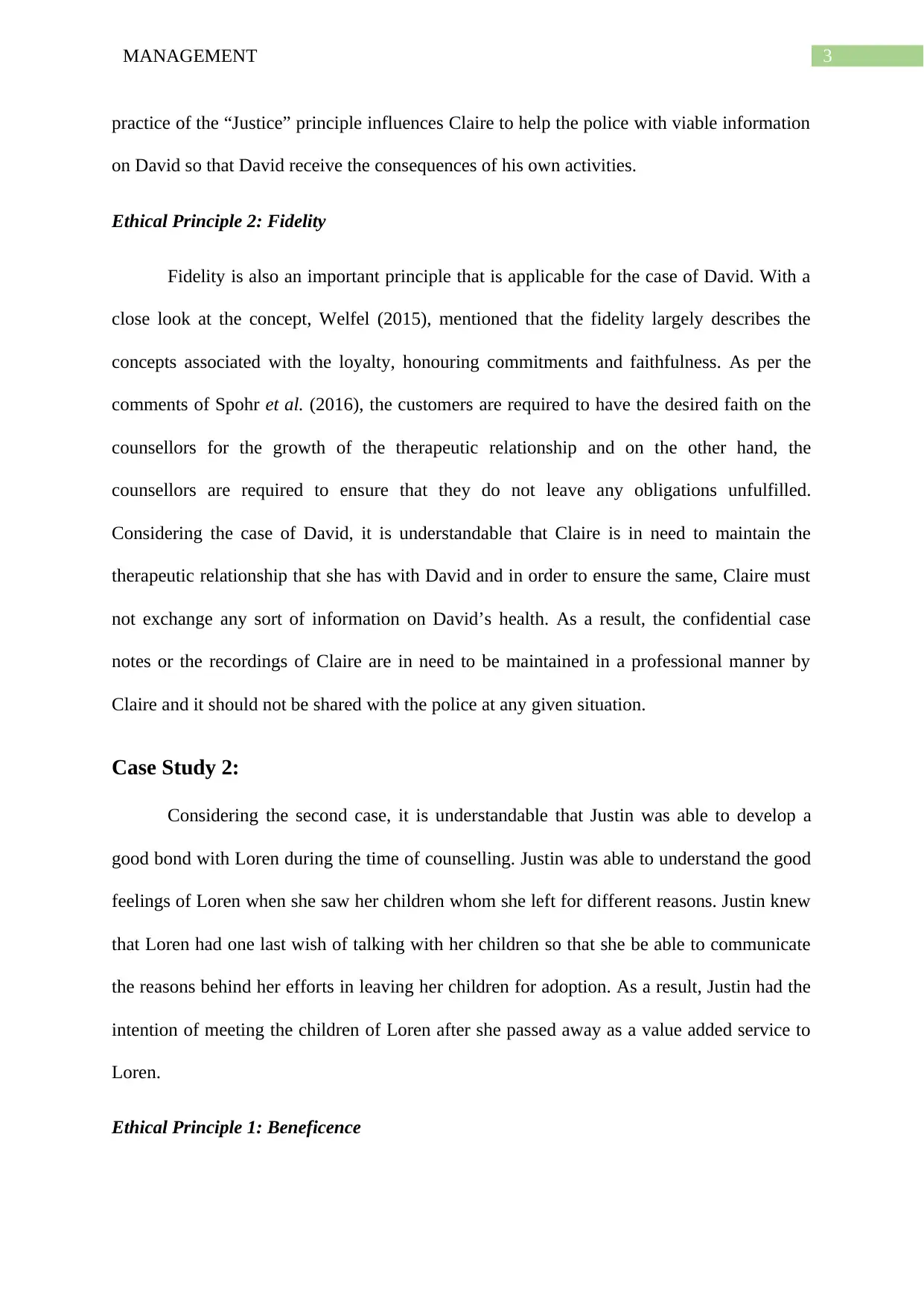
3MANAGEMENT
practice of the “Justice” principle influences Claire to help the police with viable information
on David so that David receive the consequences of his own activities.
Ethical Principle 2: Fidelity
Fidelity is also an important principle that is applicable for the case of David. With a
close look at the concept, Welfel (2015), mentioned that the fidelity largely describes the
concepts associated with the loyalty, honouring commitments and faithfulness. As per the
comments of Spohr et al. (2016), the customers are required to have the desired faith on the
counsellors for the growth of the therapeutic relationship and on the other hand, the
counsellors are required to ensure that they do not leave any obligations unfulfilled.
Considering the case of David, it is understandable that Claire is in need to maintain the
therapeutic relationship that she has with David and in order to ensure the same, Claire must
not exchange any sort of information on David’s health. As a result, the confidential case
notes or the recordings of Claire are in need to be maintained in a professional manner by
Claire and it should not be shared with the police at any given situation.
Case Study 2:
Considering the second case, it is understandable that Justin was able to develop a
good bond with Loren during the time of counselling. Justin was able to understand the good
feelings of Loren when she saw her children whom she left for different reasons. Justin knew
that Loren had one last wish of talking with her children so that she be able to communicate
the reasons behind her efforts in leaving her children for adoption. As a result, Justin had the
intention of meeting the children of Loren after she passed away as a value added service to
Loren.
Ethical Principle 1: Beneficence
practice of the “Justice” principle influences Claire to help the police with viable information
on David so that David receive the consequences of his own activities.
Ethical Principle 2: Fidelity
Fidelity is also an important principle that is applicable for the case of David. With a
close look at the concept, Welfel (2015), mentioned that the fidelity largely describes the
concepts associated with the loyalty, honouring commitments and faithfulness. As per the
comments of Spohr et al. (2016), the customers are required to have the desired faith on the
counsellors for the growth of the therapeutic relationship and on the other hand, the
counsellors are required to ensure that they do not leave any obligations unfulfilled.
Considering the case of David, it is understandable that Claire is in need to maintain the
therapeutic relationship that she has with David and in order to ensure the same, Claire must
not exchange any sort of information on David’s health. As a result, the confidential case
notes or the recordings of Claire are in need to be maintained in a professional manner by
Claire and it should not be shared with the police at any given situation.
Case Study 2:
Considering the second case, it is understandable that Justin was able to develop a
good bond with Loren during the time of counselling. Justin was able to understand the good
feelings of Loren when she saw her children whom she left for different reasons. Justin knew
that Loren had one last wish of talking with her children so that she be able to communicate
the reasons behind her efforts in leaving her children for adoption. As a result, Justin had the
intention of meeting the children of Loren after she passed away as a value added service to
Loren.
Ethical Principle 1: Beneficence
Paraphrase This Document
Need a fresh take? Get an instant paraphrase of this document with our AI Paraphraser
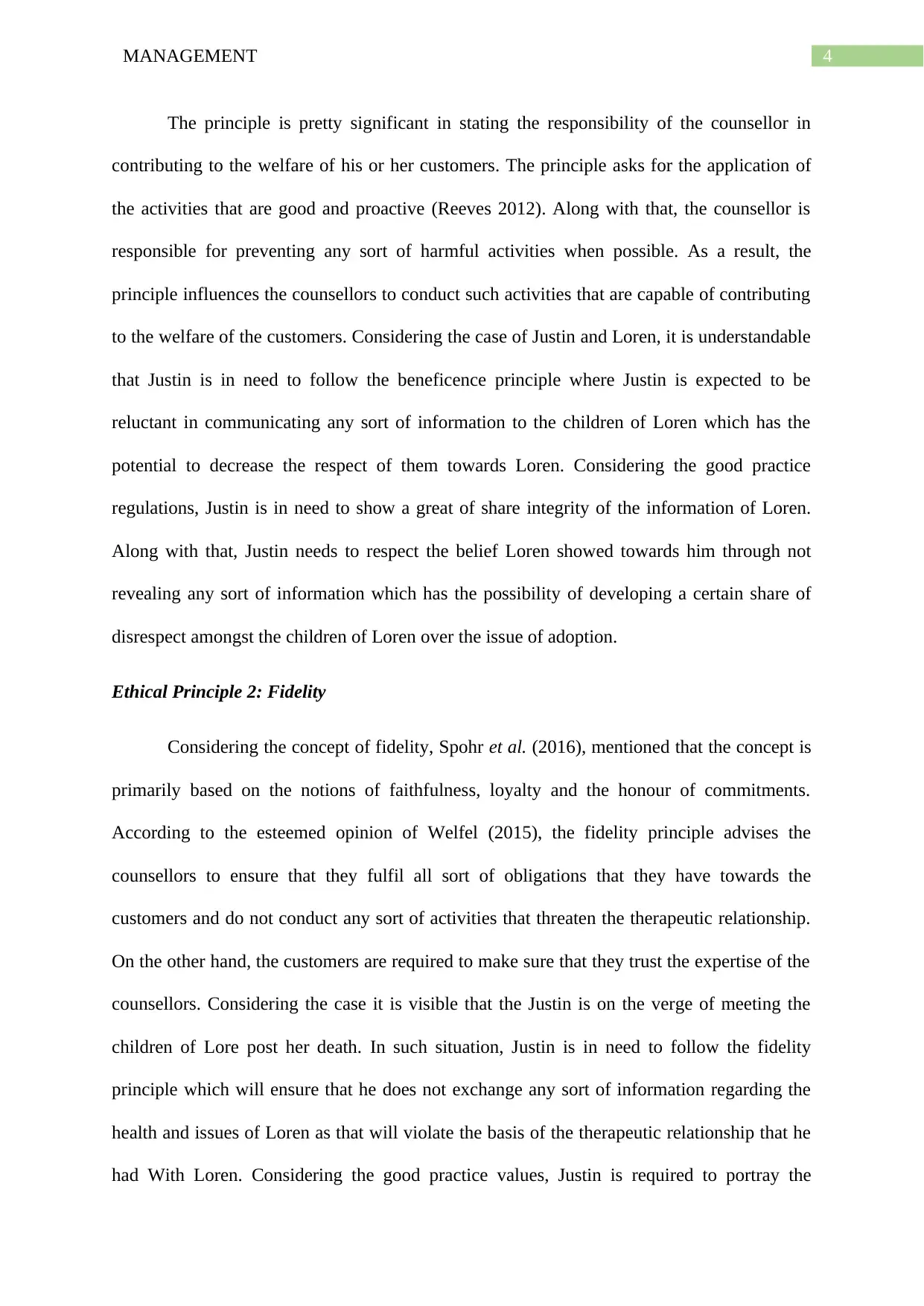
4MANAGEMENT
The principle is pretty significant in stating the responsibility of the counsellor in
contributing to the welfare of his or her customers. The principle asks for the application of
the activities that are good and proactive (Reeves 2012). Along with that, the counsellor is
responsible for preventing any sort of harmful activities when possible. As a result, the
principle influences the counsellors to conduct such activities that are capable of contributing
to the welfare of the customers. Considering the case of Justin and Loren, it is understandable
that Justin is in need to follow the beneficence principle where Justin is expected to be
reluctant in communicating any sort of information to the children of Loren which has the
potential to decrease the respect of them towards Loren. Considering the good practice
regulations, Justin is in need to show a great of share integrity of the information of Loren.
Along with that, Justin needs to respect the belief Loren showed towards him through not
revealing any sort of information which has the possibility of developing a certain share of
disrespect amongst the children of Loren over the issue of adoption.
Ethical Principle 2: Fidelity
Considering the concept of fidelity, Spohr et al. (2016), mentioned that the concept is
primarily based on the notions of faithfulness, loyalty and the honour of commitments.
According to the esteemed opinion of Welfel (2015), the fidelity principle advises the
counsellors to ensure that they fulfil all sort of obligations that they have towards the
customers and do not conduct any sort of activities that threaten the therapeutic relationship.
On the other hand, the customers are required to make sure that they trust the expertise of the
counsellors. Considering the case it is visible that the Justin is on the verge of meeting the
children of Lore post her death. In such situation, Justin is in need to follow the fidelity
principle which will ensure that he does not exchange any sort of information regarding the
health and issues of Loren as that will violate the basis of the therapeutic relationship that he
had With Loren. Considering the good practice values, Justin is required to portray the
The principle is pretty significant in stating the responsibility of the counsellor in
contributing to the welfare of his or her customers. The principle asks for the application of
the activities that are good and proactive (Reeves 2012). Along with that, the counsellor is
responsible for preventing any sort of harmful activities when possible. As a result, the
principle influences the counsellors to conduct such activities that are capable of contributing
to the welfare of the customers. Considering the case of Justin and Loren, it is understandable
that Justin is in need to follow the beneficence principle where Justin is expected to be
reluctant in communicating any sort of information to the children of Loren which has the
potential to decrease the respect of them towards Loren. Considering the good practice
regulations, Justin is in need to show a great of share integrity of the information of Loren.
Along with that, Justin needs to respect the belief Loren showed towards him through not
revealing any sort of information which has the possibility of developing a certain share of
disrespect amongst the children of Loren over the issue of adoption.
Ethical Principle 2: Fidelity
Considering the concept of fidelity, Spohr et al. (2016), mentioned that the concept is
primarily based on the notions of faithfulness, loyalty and the honour of commitments.
According to the esteemed opinion of Welfel (2015), the fidelity principle advises the
counsellors to ensure that they fulfil all sort of obligations that they have towards the
customers and do not conduct any sort of activities that threaten the therapeutic relationship.
On the other hand, the customers are required to make sure that they trust the expertise of the
counsellors. Considering the case it is visible that the Justin is on the verge of meeting the
children of Lore post her death. In such situation, Justin is in need to follow the fidelity
principle which will ensure that he does not exchange any sort of information regarding the
health and issues of Loren as that will violate the basis of the therapeutic relationship that he
had With Loren. Considering the good practice values, Justin is required to portray the
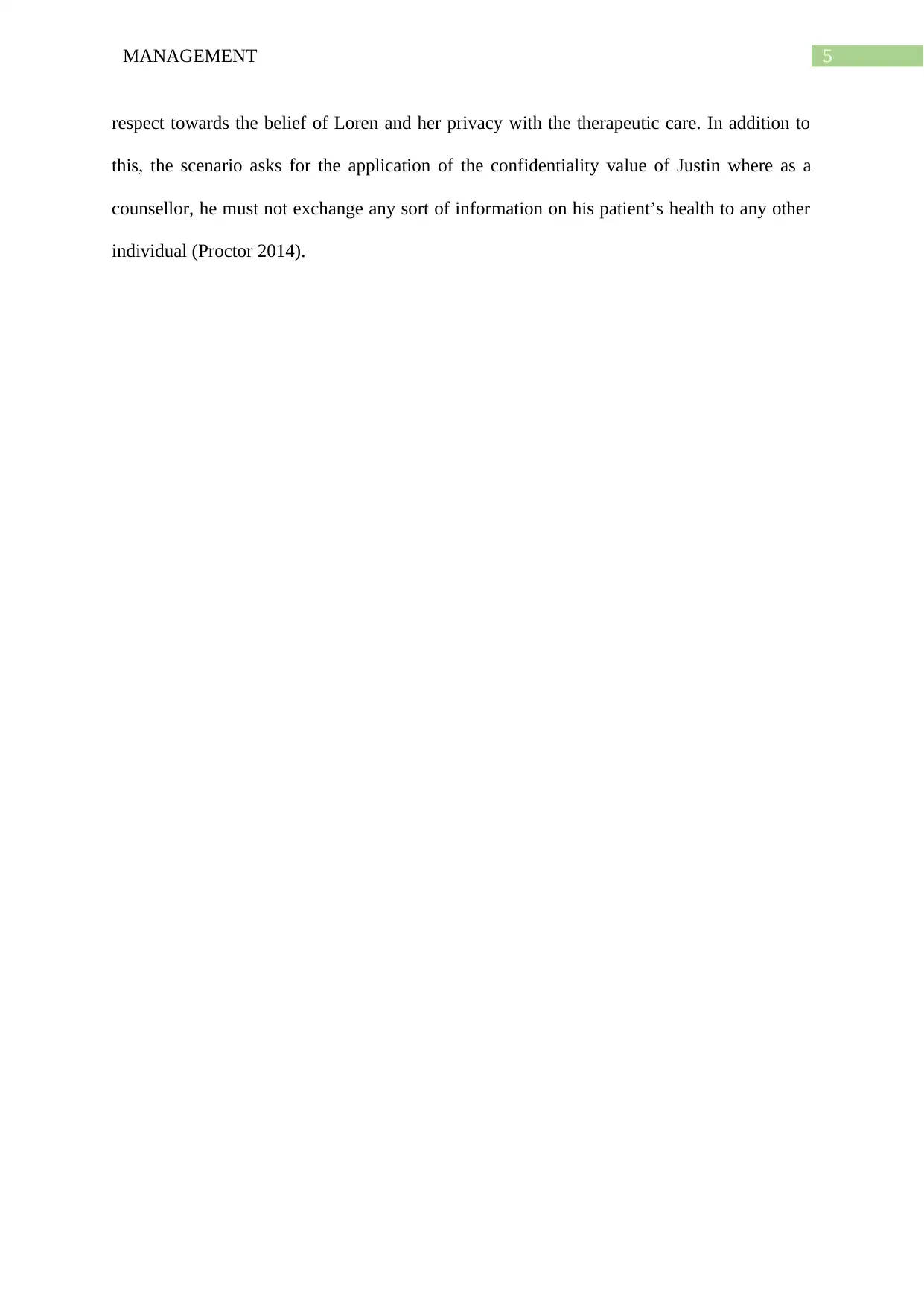
5MANAGEMENT
respect towards the belief of Loren and her privacy with the therapeutic care. In addition to
this, the scenario asks for the application of the confidentiality value of Justin where as a
counsellor, he must not exchange any sort of information on his patient’s health to any other
individual (Proctor 2014).
respect towards the belief of Loren and her privacy with the therapeutic care. In addition to
this, the scenario asks for the application of the confidentiality value of Justin where as a
counsellor, he must not exchange any sort of information on his patient’s health to any other
individual (Proctor 2014).
⊘ This is a preview!⊘
Do you want full access?
Subscribe today to unlock all pages.

Trusted by 1+ million students worldwide
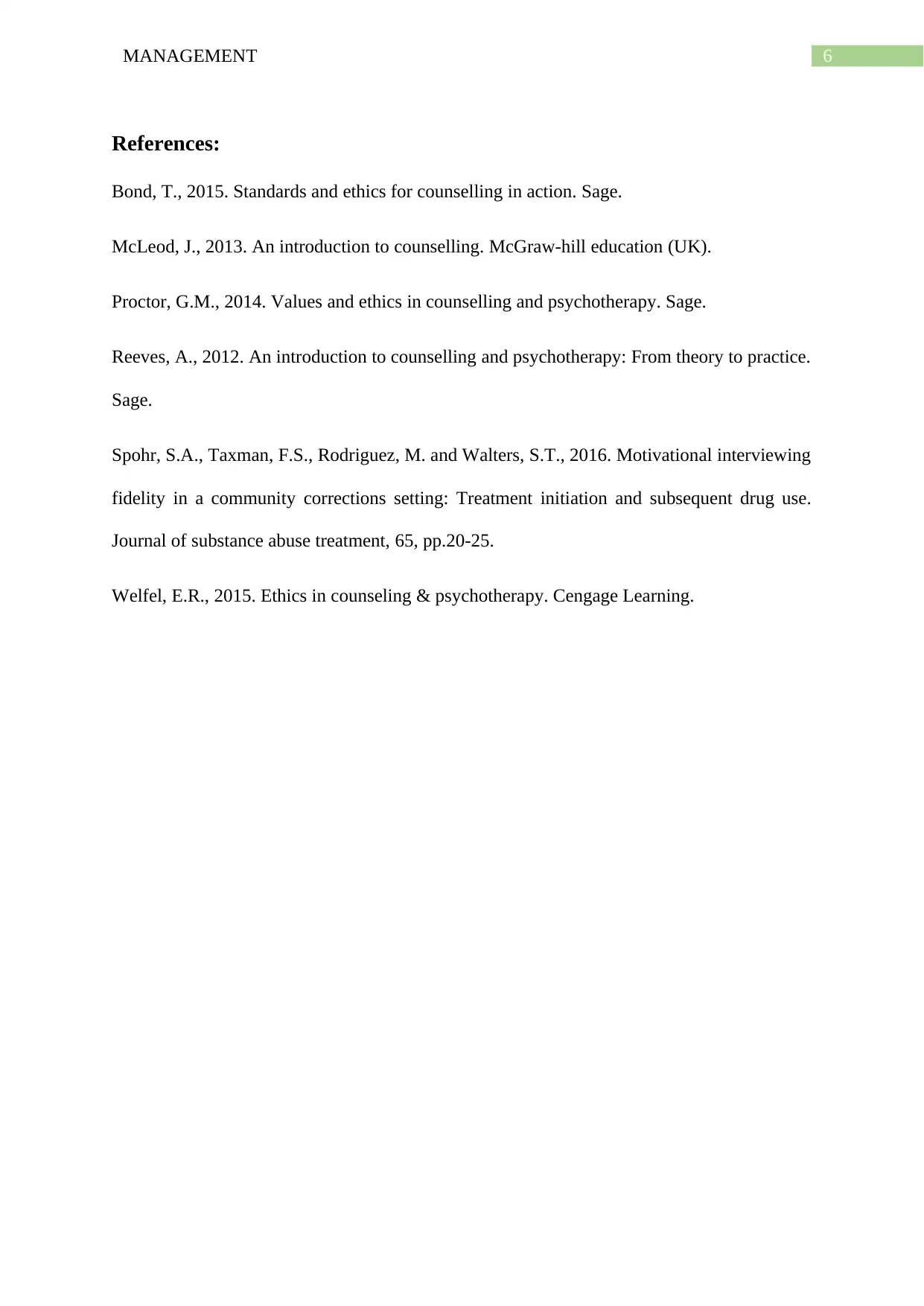
6MANAGEMENT
References:
Bond, T., 2015. Standards and ethics for counselling in action. Sage.
McLeod, J., 2013. An introduction to counselling. McGraw-hill education (UK).
Proctor, G.M., 2014. Values and ethics in counselling and psychotherapy. Sage.
Reeves, A., 2012. An introduction to counselling and psychotherapy: From theory to practice.
Sage.
Spohr, S.A., Taxman, F.S., Rodriguez, M. and Walters, S.T., 2016. Motivational interviewing
fidelity in a community corrections setting: Treatment initiation and subsequent drug use.
Journal of substance abuse treatment, 65, pp.20-25.
Welfel, E.R., 2015. Ethics in counseling & psychotherapy. Cengage Learning.
References:
Bond, T., 2015. Standards and ethics for counselling in action. Sage.
McLeod, J., 2013. An introduction to counselling. McGraw-hill education (UK).
Proctor, G.M., 2014. Values and ethics in counselling and psychotherapy. Sage.
Reeves, A., 2012. An introduction to counselling and psychotherapy: From theory to practice.
Sage.
Spohr, S.A., Taxman, F.S., Rodriguez, M. and Walters, S.T., 2016. Motivational interviewing
fidelity in a community corrections setting: Treatment initiation and subsequent drug use.
Journal of substance abuse treatment, 65, pp.20-25.
Welfel, E.R., 2015. Ethics in counseling & psychotherapy. Cengage Learning.
Paraphrase This Document
Need a fresh take? Get an instant paraphrase of this document with our AI Paraphraser

7MANAGEMENT
Bibliography:
Counseling.org. 2020. [online] Available at:
<https://www.counseling.org/docs/ethics/practitioners_guide.pdf>
Bibliography:
Counseling.org. 2020. [online] Available at:
<https://www.counseling.org/docs/ethics/practitioners_guide.pdf>
1 out of 8
Your All-in-One AI-Powered Toolkit for Academic Success.
+13062052269
info@desklib.com
Available 24*7 on WhatsApp / Email
![[object Object]](/_next/static/media/star-bottom.7253800d.svg)
Unlock your academic potential
Copyright © 2020–2025 A2Z Services. All Rights Reserved. Developed and managed by ZUCOL.